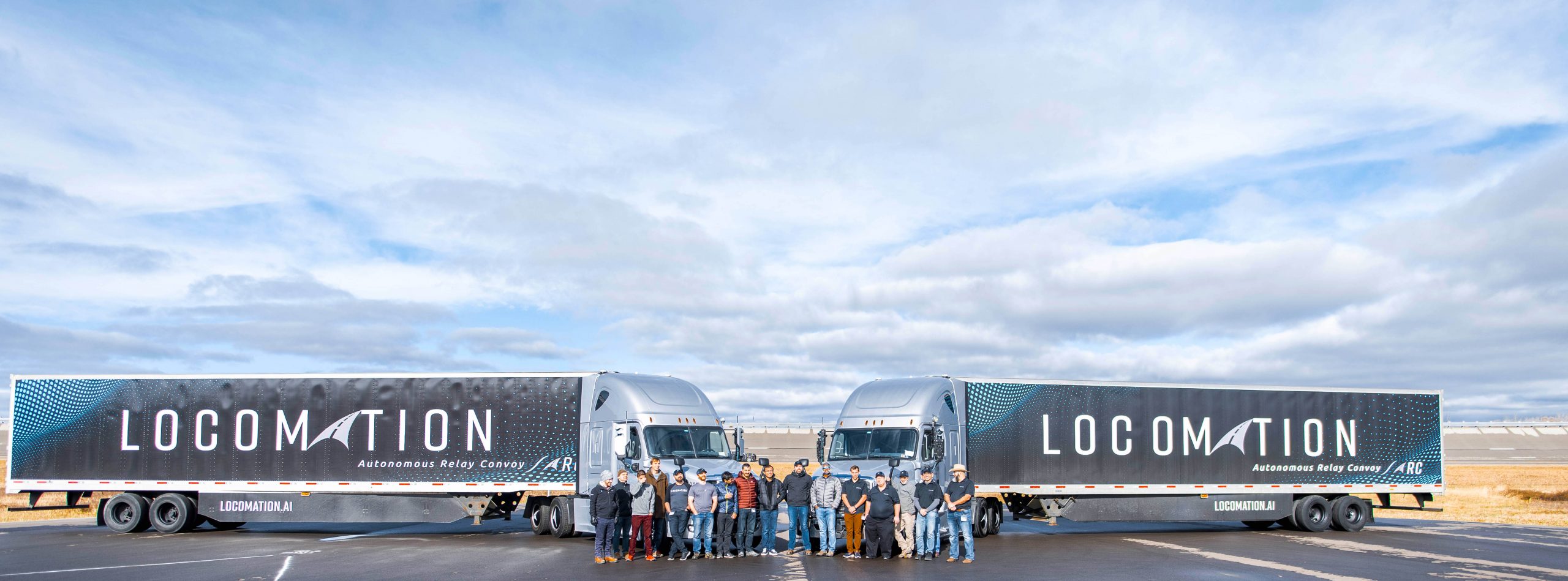Well beyond its historic and political meanings, the phrase “Young Turks” has been used colloquially to describe people with an itching determination to implement change and reform and a small tolerance for patience. Self-driving vehicles are full of promising changes ranging from increased safety to higher efficiency, but largely bottlenecked in red tape, testing and a still undefined regulatory environment. This brings us to the Turkish brothers, Çetin and Tekin Meriçli, two of the co-founders of Locomation, an autonomous driving truck startup with a robotics rock star team and a game-changing technology that shows little patience for implementing radical change.
There are various companies playing in this space, including some of the Goliaths like Alphabet’s Waymo, Tesla, Volvo and Daimler among others. But putting the first self driving truck on American highways is probably close to ten years away. Locomation is not looking to wait that long, they have developed an autonomous relay convoy platform that allows a driverless truck to closely follow a truck with a driver in front of it. And the rubber will meet the road in some 18 months.
We spoke to Çetin, who is also Locomation’s CEO, to learn more about why and how two robotics engineering brothers from Istanbul ended up producing self driving trucks in Pittsburgh and why and how they’re planning to disrupt the space.
Pittsburgh clearly has become the place to be for self-driving vehicles, but why trucks? “Trucks make a ton of sense as the first target for autonomous driving from many angles: a massive market, a very ineffective and archaic industry ripe for disruption, and a significant qualified labor shortage are a few top business drivers,” he commented. The trucking industry is approaching the $800 billion mark and employs close to a million drivers, so the impact is no pocket change. “Our convoying technology enables delivery of two times the cargo, two times farther and twice as fast, while significantly improving the overall safety via autonomy sensors and algorithms. From a cost perspective, our system reduces the operating costs per mile by about 30%, and even after Locomation gets paid, the customers realize an additional 15% to 20% savings, which is a game changer. Our approach also aims to improve the driving comfort and make the convoy driving a premium job.”
The convoying technology still requires one driver in each truck, but the driver in the back truck can be sleeping allowing both drivers to take turns and reach the destination faster and better rested. Plus reduced aerodynamic drag delivers some fuel efficiency, so the benefits are multiple. Çetin further points out that “ample space and power on the trucks, being able to justify a significant hardware cost in exchange of reduced transportation costs, and inherently more tractable operating environment on the interstates make trucks very attractive platforms for self-driving.”
But there’s a lot at stake in terms of safety and the technology is not simple. However, and perhaps in a counterintuitive way, self driving trucks are poised to deliver higher safety to drivers and pedestrians alike. “Specifically, in the self-driving vehicles case, the main challenge is to identify the other actors and furthermore predict what they will do in the next couple of seconds. However much one can control the amount of uncertainty and unpredictability in the environment, the easier it is to build and validate a self-driving system. In our particular case, Locomation initially focuses on an autonomous convoy setup consisting of a human driven lead truck closely followed by a self-driving truck. The human driven leader acts as a buffer between the open world’s chaos and unpredictability and the self-driving follower truck, effectively reducing the prediction complexity.”
Locomotion already has prototypes piloting around Pennsylvania, Ohio and other parts of the country. The commercial rollout is planned for mid-2022 and the company already has a nine-figure contract with Wilson Logistics, a large fleet operator with 1,120 trucks.
So ‘why Pittsburgh?” we asked, almost rhetorically. “That was a very organic decision for us as we already were in Pittsburgh and deeply connected to the CMU ecosystem here, with team members having families with job and school ties to the city. We are staying in Pittsburgh because it is the best place to build a cutting-edge AI and robotics company. It is also significantly more affordable than most alternatives. To be honest, we haven’t even thought of not staying in Pittsburgh so it was mostly a decision by omission.” He elaborates “it is in Pittsburgh’s DNA to build things with your bare hands. The ecosystem is very conducive to starting something new, and the rather small professional circle enables one to meet with almost anyone relevant in record time. I often think to myself ‘this is how Silicon Valley in the ‘70s must have felt.’”
So what made the two brothers leave their beloved Istanbul, a metropolis of some 20 million people, to the “miniaturized big city” of Pittsburgh, as Çetin calls it? He explains “I did not know much about Pittsburgh other than knowing CMU is in Pittsburgh, it is a smaller city consistently in the ‘most livable cities’ lists, but I did not care all that much because I was laser focused on being at CMU,” he comments. “My first year or two were very joyful as I discovered the American way of living, but was mostly confined to a very limited set of friends and CMU campus. As Pittsburgh transitioned from being ‘home away from home’ to just ‘home,’ it started growing on me and to date, I am perpetually mesmerized by how uniquely beautiful it is both from a physical point of view and also lifestyle-wise. I just love Pittsburgh.”
It’s now been several years since he moved to town, so other than all the cool robotics tech and innovation, what keeps him here? Like many of us in town, Çetin enjoys the parks, bike trails, cool bookstores, and especially the food. He shared a long list of favorites, including Lucy’s Bahn Mi “a must try,” Espresso A Mano “the coolest coffee place I know,” Umami, Morcilla, Driftwood, Noodlehead and Colangelo’s, calling chefs like Justin Severino and Roger Li “national treasures.” He elaborates “having all or most perks of a big city in a smaller footprint with more space, more greens, and an ease of day to day living is just the perfect combination. After a lifetime of planning and struggles of daily minutia like just getting to and from work, it is inexplicably relaxing to live in Pittsburgh, but still breathe that big city air.”
If there is one thing he could change about Pittsburgh, we asked him, what would it be? “The weather!” Well, he’s got his work cut out for his next disruptive startup. Until then, Çetin, keep on truckin’.


